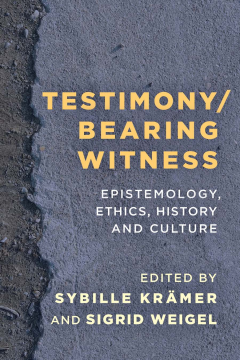
Additional Information
Book Details
Abstract
What is the epistemological value of testimony? What role does language, images, and memory play in its construction? What is the relationship between the person who attests and those who listen? Is bearing witness a concept that is exclusively based in interpersonal relations? Or are there other modes of communicating or mediating to constitute a constellation of testimony?
Testimony/Bearing Witness establishes a dialogue between the different approaches to testimony in epistemology, historiography, law, art, media studies and psychiatry. With examples including the Holocaust, the Khmer Rouge Killing Fields and the Armenian genocide the volume discusses the chances and limits of communicating epistemological and ethical, philosophical and cultural-historical, past and present perspectives on the phenomenon and concept of bearing witness.
The collection by Sybille Krämer and Sigrid Weigel on experience, meaning and notions of testimony/bearing witness strike straight at the heart of fundamental epistemological questions of calamity and its philosophical and cultural repercussions. From the objective perspective(s) of subjectivity up to the social constellation of testifying, the transformations of existential bearing unto judgment, and of judgement unto knowledge are scrutinized in a multitude of most enlightening approaches.
Dan Diner, Professor of Modern History, The Hebrew University, Jerusalem
Testimony references at root a witness (testis) who acts (monium). Meticulously and imaginatively compiled by Kramer and Weigel this collection offers a dazzling array of scholars from multifarious disciplines adducing theoretical testimony to the epistemological and emotional enigma of the autography of the witness.
Peter Goodrich, Director, Program in Law and Humanities at Cardozo School of Law
Sybille Krämer is former Professor of Philosophy at Freie Universität Berlin and from 2019 she will hold a senior professorship at Leuphana University Lueneburg.
Sigrid Weigel is former Director of the Zentrum für Literatur- und Kulturforschung (ZfL) in Berlin.
Table of Contents
| Section Title | Page | Action | Price |
|---|---|---|---|
| Testimony/Bearing Witness | Cover | ||
| Contents | v | ||
| Acknowledgements | vii | ||
| Introduction: Converging the Yet-Separate Theoretical Discourses of Testimony Studies | ix | ||
| Part I: Historical perspectives | 1 | ||
| 1 The Presence of the Witness | 3 | ||
| 2 The Debate on Testimonies Concerning Miracles and History in Seventeenth- to Eighteenth-Century France | 17 | ||
| 3 Enlightenment Perspectives on the Problem of Testimony | 33 | ||
| Part II: International sites | 53 | ||
| 4 Testimony in Light of the Khmer Rouge Trials: Reflections of a Judge Involved | 55 | ||
| 5 The Armenian Case: Bearing Witness by Mediation of the Second or Third Generation | 69 | ||
| 6 Testimonies in the Spaces of Promoting and Opposing Violent Extremism | 83 | ||
| Part III: Holocaust: paradigm and intersection of survivor testimony and philosophical epistemology | 103 | ||
| 7 The Power and Perils of Being Believed | 105 | ||
| 8 The Testimony of the Traumatic Witness: The Tension Between the Therapeutic Act and the Loss of Words and Their Meaning | 121 | ||
| 9 Analysing Holocaust Survivor Testimony: Certainties, Scepticism, Relativism | 137 | ||
| 10 Probing the Limits of Visual Testimonies: A Cinematic Approach to Different Modes of Testimony from the Warsaw Ghetto in Hersonski’s A Film Unfinished | 167 | ||
| Part IV: Visibility and media history of testimony | 187 | ||
| 11 Like a Thief in the Night: Witnessing and Watching | 189 | ||
| 12 Remembrance of Things Past: Testimony and Imagination | 209 | ||
| 13 The 1,001 Reflections of an Ongoing Catastrophe: From Visual to Cinematic Testimony | 223 | ||
| Part V: Epistemology of testimony | 245 | ||
| 14 Epistemic Dependence and Trust: On Witnessing in the Third-, Second- and First-Person Perspectives | 247 | ||
| 15 The Philosophy of Testimony: Between Epistemology and Ethics | 259 | ||
| 16 Is Testimony an Epistemically Distinguished Source of Knowledge? | 275 | ||
| About the Contributors | 289 |
